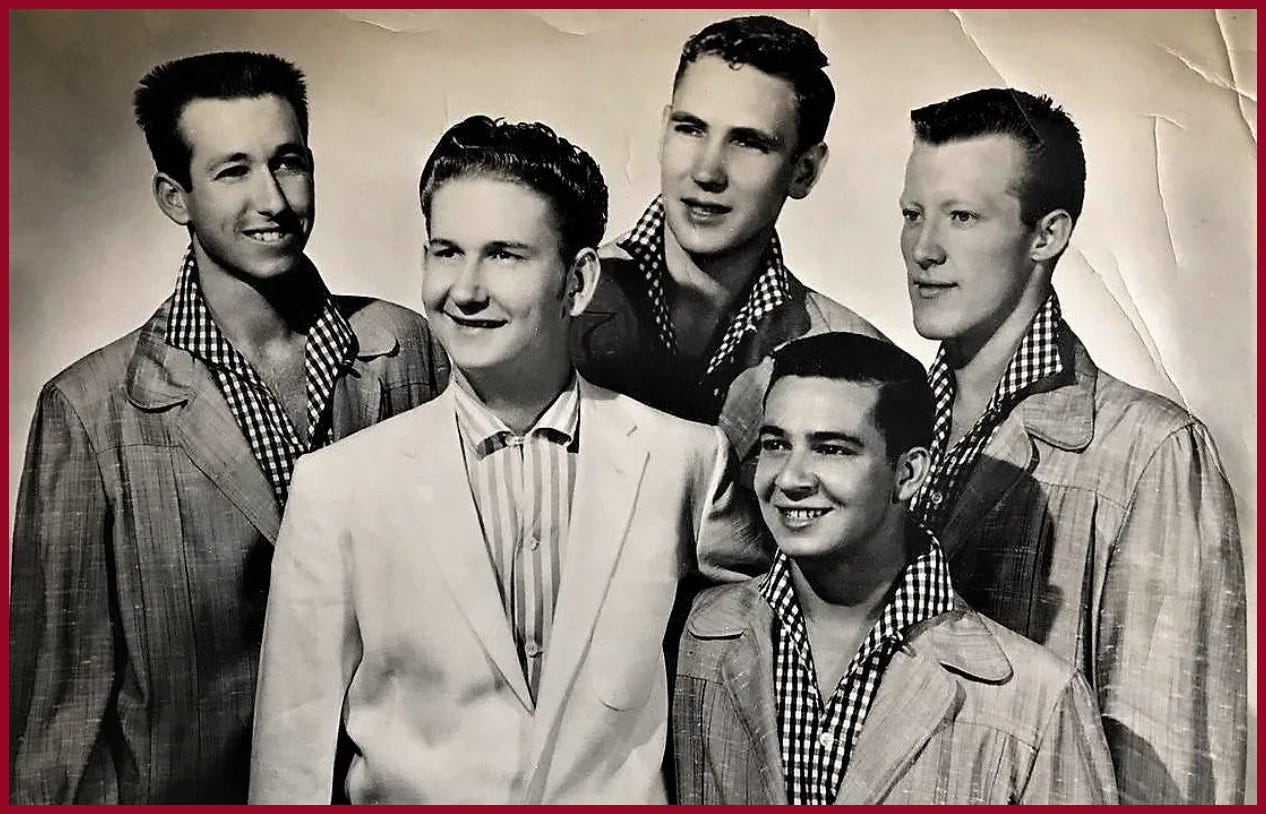Raye Anne Reeves had the top down and was flying low in the convertible T-Bird her daddy’d given her for her sixteenth birthday. Jackrabbits scarcely had time to jump out of the way. The turquoise blur sped down the highway from Kermit, Texas to Wink as Raye Anne shortened the usual 10-minute drive between the West Texas oil towns by at least two minutes.
She hit the Wink city limits, headed to the Wolf’s Den drive-in, squealed into a parking spot at the crowded hangout, then turned around to the backseat and said, “We’re here. Y’all get up.” A young man raised up, put on a cowboy hat and stretched one long leg forward between the bucket seats onto the white leather upholstered front seat. Raye Anne slapped the dusty cowboy boot away and said, “Hey, this car’s brand new!” He maneuvered himself out of the cramped backseat, took a glance around, then reached a hand back inside to the girl who’d been curled up next to him.
Betty Batchly opened her eyes and looked through the tangle of dark hair that had blown across her pretty face, then took the cowboy’s hand. He pulled, and with one fluid move, she emerged from the car. Roy Orbison’s already legendary voice drifted from the speakers that hung under the eaves of the Wolf’s Den. His lyrics matched the moment. “I don’t believe you. You’re not the truth. No one could look as good as you.” A gust of wind caught Betty’s hair and blew it away from her face. Roy sang, “Mercy, oh, oh, pretty woman.”
Roy Orbison grew up in Wink, Texas. Started his first band, The Wink Westerners, there. His music was as ubiquitous as the wind that blew sandstorms across the landscape and caused the dunes north of town to drift, their forms and shapes altering and undulating like the high falsetto of his voice. So it wasn’t unusual for his music to punctuate the most mundane events in town. But mercy! Betty was a beauty.
The pretty woman flung her arms around the cowboy’s neck, kissed him brazenly, then flopped into the passenger seat of Raye Anne Reeves’ T-Bird. A young carhop stood next to the car, popping her gum and shifting from one foot to the other, while she waited to write down Raye Anne’s order. When she began to walk off, Betty called out, “Oh, would you bring me a Dr Pepper, please? Thank you.” Then Betty Batchly gave an offhanded wave to her cowboy. The cowboy didn’t seem to notice her as he drove off in his green pickup.
Dub Watkins sidled over to the car, leaned on the hood and began chatting with Raye Anne. His face was directed toward her, but his eyes were fixed on Betty, Raye Anne’s dark-haired friend. Betty took a sip of her drink and pretended not to notice Dub at all. She poked her straw up and down in the cup until it was filled with compacted crushed ice. Then she tilted her head back, lifted the straw up to her lips and slowly sucked the ice out. It just about drove poor Dub crazy. Finally, awkwardly, he backed away, dragging his hand along the smooth, still-hot hood of Raye Anne’s car. He slowly walked back to his car. His buddies were waiting and demanded to know. “Well?” “So’d you ask her?” “What’d she say?” Dub gritted his teeth, “Hell,” he said, “I never asked her. I’m plumb paralyzed around that girl!”
It was early April, and he figured there was plenty of time left to ask her to their senior prom. He was wrong. By the end of May, Betty was married to the cowboy in the green Chevy pickup, and they had a baby due in August. Dub took Virginia Small to the prom.
Dressed in pink satin and tulle, Virginia looked sweet, like the sweet schoolgirl she was. So sweet Dub almost forgot about Betty until they were on the dance floor. Roy Orbison’s soaring voice, his mournful lyrics, caused Dub’s eyes to overflow with the thought of Betty Batchly. Roy sang, “I thought that I was over you.” Dub closed his eyes, and Roy’s voice cried the words, “I love you even more than I did before.” A tear escaped from Dub’s tightly closed eyes and fell onto Virginia’s soft white shoulder. It rolled down her soft white skin and onto the pink satin bodice of her dress. She wiped the tear away. Dub didn’t seem to notice. Roy sang on. “And I’ll always be crying, crying over you.”
By the time Betty Batchly’s baby girl was six months old, she and the cowboy had divorced. Betty moved back to live with her parents, Oral and Mavis Batchly, under the suffocating roof she’d tried so hard to get out from under. And even if she was pissy and unhappy, Brother and Sister Batchly—as they were known at the First Assembly of God church where Oral was the pastor—were relieved to have her home. It seemed to Oral that his daughter had always been unhappy. And Mavis had tried for years to make Betty conform to the rigid standards of their church. A futile effort. Mavis couldn’t remember a time when there wasn’t a divide between them.
By the time Betty was a teenager, by Sister Batchly’s narrow reckoning, the girl was out of control. Wearing lipstick and short shorts, smoking cigarettes, running around with that wild Reeves girl in that fancy car. At least once a month, a call would come from the school reporting Betty was truant, and Brother Oral would drive the highways leading out of town, searching the usual hangouts—the dirt roads that led out to the oil leases where kids would congregate and drink beer. He’d drive out to the sand dunes where kids and families went to play on the huge, shifting mounds of ancient sand. He’d park the car and listen for the hoots teenagers make when they cut loose.
Sometimes, the only sounds he could hear were the calls of the poorwills, bird calls that reminded him of the cry of a sweet, helpless child. Looking up above him in the sky where he sought the help of the good Lord, the stars were so abundant, constellations were lost in their multitude. Just as his own child was lost, he would think. And he was heartsick.
Eventually he would find her, as he always did, and bring her home again. He couldn’t be angry at her or let her see his disappointment. He showed her only forgiveness. And it was forgiveness he sought, too. Deep in his heart, he felt a failing as a pastor because it was Betty who was the true joy of his life, more than the Good Lord and Savior Jesus Christ. Brother Oral Batchly didn’t listen to or care about the wagging tongues in his congregation, the gossip that kept Sister Batchly in a tizzy. He only wanted to find a way to make Betty content. But she never was.
Oral and Mavis prayed on it day and night. And when Betty came home with her little girl, they believed the Lord had given them a second chance with a granddaughter. They hoped their pull would be stronger on her than it had been on Betty. So, they turned their attention away from the wayward mother and doted on the child, Renee. Still, Betty felt saddled with the baby. She resented her deeply, blamed the baby for her bleak prospects.
She got a job at the grocery store. That didn’t suit her. She took a job working in the box office at the Rig Movie Theater, where even the marquee that spanned beneath the full-sized oil rig that sat atop the building couldn’t light up her dissatisfied face. Finally, it was a job at Day Drugstore that suited her. Working the soda fountain afforded her an attentive audience of young men—high school boys—by then years younger than her but still susceptible to her wiles. But after nearly four years, she was growing more discontent by the day. At last, an opportunity presented itself. On a hot September afternoon, Clarence Ashlock sat down at the soda fountain and asked for a large Coke with lots of ice.
Clarence had been to the courthouse in Kermit to check on some business, and on his way home to Dixon, he stopped off in Wink for a quick bite to eat. It was one o’clock. Day Drug gave free drinks to the football team, and in two hours, the place would be overrun with teenagers. But right then, Betty had all the time she needed to focus her attention on the nice older man who’d stepped into her small domain. In the time it took him to drink a Coke and eat a pimento cheese sandwich, she had spun a web. She told him her husband had been killed working on an oil rig and left her with a baby to raise on her own. Said she’d given up a good job opportunity with an oil company in Houston to stay home and nurse her mother back to health after a stroke. She gazed away wistfully, told him about her hopes and dreams, embellished small shreds of truth and fabricated the rest. And as she spun her web, she twirled her dark hair around her finger and poked a straw up and down in a cup of ice.
Betty cast her line, and before Clarence Ashlock left Day Drugstore that afternoon, he'd bitten. He offered to help the beautiful West Texas siren, said he would recommend her for a job in the County Clerk’s office in Dixon where she could work her way up the ladder and make a better life for herself and her little girl Renee. Betty packed up. She announced to her mother and father that she was leaving town and leaving Renee with them. “Not for long,” she assured them. “Just until I get on my feet.” By Christmas, she had married the nice man with the kind offer of help and moved herself and Renee into Clarence Ashlock’s comfortable beige brick house on Third Street and Avenue B. The house with the perfect brown trim, the plush lawn, the backyard with the lonely swingset and playhouse where another little girl had entertained dolls and a little dog. The house with the fragrant bed of hyacinths, one of only two houses in town with those deep blue flowers.
While Betty stewed there in her new digs, Clarence rejoiced in what to him felt like a resurrected family. Like Oral and Mavis, he believed Renee was his second chance. He wrapped his heart around the child. Unlocked old memories, along with the door to the playhouse with the pink linoleum floors. Dusted off lonely chairs, a tea set and stuffed animals. Pushed his darling stepchild high on swings that had been neglected and forlorn. And when he brought her a black-and-white terrier puppy, she squealed with surprise, kissed Clarence on the cheek, hugged his neck. Clarence was the only daddy she’d ever known, and she loved him with her whole, sweet heart.
Years before, Clarence’s wife Edna had at last succumbed to the grief that had cast a shadow across the neat house they shared. His sorrow was enormous but so was his relief that his wife’s suffering was done. His relief turned into crippling guilt, though, when he began to suspect that somehow, through her pained oblivion, his wife had become aware that in the early evenings after he’d seen she was safe and asleep, he sought comfort with someone else.
And it was that devoted companion, Vera Van Camp, who took the brunt of his torment, bore the weight of his guilt. The man she’d loved for such a long time—cared for in every way she knew how, grieved alongside in the aftermath of Edna’s death—turned away from her. She became victim to his guilt. Knowing how much he wanted to reclaim the past, she could only stand by and watch as he tried to, with a new wife and a young child.
Again, the people of Dixon embraced Clarence’s circumstances. The new wife. The sweet child. The community had been unfailingly sympathetic to Clarence and Edna when they lost their child. The people of Dixon had shared their burden of grief at a time when so many other children were dying of the cruel virus. The whole country was in mourning in the face of the polio epidemic. When little June Ashlock was stricken with the virus, Edna never left her bedside day or night. Clarence left her only to go to work, returning each afternoon with smiles and surprises to cheer them when the news from the doctors gave them nothing but despair. Over the months that their child lay in the hospital, Clarence added to a menagerie of stuffed animals that grew and grew. Names were decided on and stories created for each one: the fox, the tabby cat, the white bunny and striped tiger, the bushy-tailed squirrel and, of course, the bear. Clarence encouraged his child to remain brave and strong, reminding her that all these toys were the creation of Margarete Steiff, who as a child in Germany had also contracted polio and survived and made it possible for children the world over to have sweet, furry companions like those surrounding June’s bed. The last gift Clarence brought his little girl was a Steiff teddy bear tea set. Together, the mother and father and child tipped the little china cups to their lips in a pantomime tea party.
So, when little June Ashlock died, the hearts of the people of Dixon were open to Clarence and Edna, grieving mother and father, for seeking solace each in their own way. As Edna sank deeper and deeper into the abyss, Clarence accepted an offer of help from his aunt Peg. She stayed with Edna while Clarence was at work, devoting herself to keeping Edna cared for. She read to her, talked to her, shared news of the world, goings-on around town—anything to try to engage her, try to bring her back into the world.
One day, Peg slipped and mentioned Vera Van Camp and Clarence’s name together in a way that registered even in Edna’s stupor. Edna’s soft eyes came into focus for an instant. A tiny wince, then a brief moment of recognition—even gratitude—flickered across her face. In the following weeks, Edna began to watch, observing Peg’s movements, noting where she placed things, watching through the bathroom door to see exactly where her pill bottles were placed.
It was an ordinary afternoon. Clarence got home and exchanged brief words of goodbye with his aunt. Then he went in to check on his wife, sat at her bedside. He told her about his day, he told her how June’s hyacinths were growing. He kissed her sweetly and said, “I love you, Edna.” When Edna heard him drive away, knowing he was leaving her to join his other companion—the one who was present and functioning—she lifted off the blanket Clarence had so carefully pulled around her shoulders, got out of her bed, walked to the bathroom and opened the medicine cabinet. And from the bottle she knew to be “the one,” she poured all but one pill into her palm and went back to her bed. She knew Clarence would find her sleeping just as he’d left her and sleeping still in the morning and then sleeping forever. She was happy for the first time in years.
Once Clarence and Betty were married, the security he provided wasn’t nearly enough to satisfy Betty. When Renee started school, Betty had whole days to kill. Now what was she supposed to do with herself? Her old friend Raye Anne Reeves began to drive over to Dixon, and the two of them would spend afternoons sipping Cokes, flirting with the young boys at the drive-in on South Main Street, shopping for lipstick and nail polish at the drugstore, buying or taking out clothes on approval from the Style Shop. Soon Betty began concocting excuses to go out at night, and she and Raye Anne would head to the bars and honky-tonks near the state line. Nights out got longer, and before long it wasn’t just Raye Anne’s turquoise T-Bird that sat parked in front of the bars and dancehalls but a familiar green pickup as well.
It was the night of Good Friday—the early hours of Saturday morning, actually. A turquoise blur was speeding along the highway between the state line and Dixon. Raye Anne took her eyes off the road and reached over to punch buttons on the radio to find a station that would oblige her yen for a ballad, then cranked the volume, raised her hand through the open convertible roof and joined Dusty Springfield at full volume singing, “You don’t have to stay forever, Just be close at hand, Believe me, Believe—” Then she abruptly yelled, “Oh shit!” when a tire blew out. Raye Anne grabbed the wheel now with both her hands. Wrestled the car to keep it on the blacktop. She stood on the brake but couldn’t bring the T-Bird to a stop before it slammed into the bar ditch.
Raye Ann sat gripping the steering wheel. She held her breath and got hold of herself before she threw the car in reverse and stepped on the gas, getting back on the road. She wasn’t about to get dirt on her in that ditch if she could help it. She was wearing white pants—even though it was technically before Easter—tight pants that showed off her figure, with little slits that hit just at the ankle, and a cashmere sweater set that wasn’t enough to keep the chilly gusts from piercing her in the wee, dark hours. She pulled the short cardigan around her and looked around to see if the cowboy was going to get out and see to this mishap. Instead, Betty jumped out of the backseat and stood next to her, eyeing the blown tire. Together, they were as incapable of changing a tire as Raye Anne was by herself. “What’s he doing?” Raye Anne hissed, referring to the cowboy. “Go wake his sorry ass up and tell him to get out here and change this goddamned tire!” Betty started to turn back toward the car when a sudden gust of wind yanked the headscarf off her head. It caught on the barbed-wire fence yards away and blew sideways like a flower-print windsock at an airstrip. Betty started to run after it when she and Raye Anne saw the white lines on the asphalt ahead illuminate. Then headlights emerged out of the blackness of the deserted stretch of highway. The car came to a stop alongside, and two men stepped out and approached the two young women. Less than a minute later, Betty’s scream woke the cowboy up. He stretched out a long leg from the backseat and grabbed hold of the white upholstered front seat to lift himself up. A single shot rang out. White leather was splashed with red.
Ray Wilburn, the Beal County Sheriff, broke the news to Clarence four hours later that his young wife Betty, along with another young woman and a man from Wink, Texas, had been murdered sometime early that morning.
At the cemetery, Vera Van Camp leaned down and whispered in Renee’s ear. The little girl looked across at Oral and Mavis Batchly, the grandparents she barely knew. Renee walked over and shyly gave them hugs around the neck just like Vera had said she should. Then she walked solemnly back to Clarence, the only daddy she’d ever known. Clarence Ashlock nodded to the Batchlys and placed his hand on his adopted daughter’s small shoulder. Renee stood between Clarence and Vera, each of them holding securely onto one of her small hands.
Oral Batchly spoke a soft prayer, and he and Mavis Batchly committed their daughter Betty to the Lord. The wind was blowing across the cemetery. A funnel of dust rose up and was carried away like the falsetto notes of Roy Orbison singing, “It’s over, it’s over, it’s over.”
























Share this post